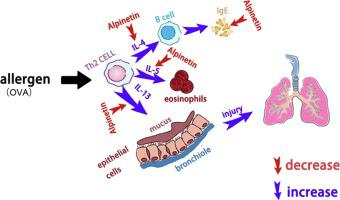International Immunopharmacology ( IF 4.8 ) Pub Date : 2020-10-08 , DOI: 10.1016/j.intimp.2020.107073 Di Wu , Shuangqiu Li , Xiao Liu , Jingnan Xu , Aimin Jiang , Yong Zhang , Ziyi Liu , Jingjing Wang , Ershun Zhou , Zhengkai Wei , Zhengtao Yang , Changmin Guo

|
Allergic asthma is the most common type of asthma which characterized by inflammatory responses of the airways. Alpinetin, a flavonoid compound derived from the ginger family of medicinal herbs, possesses various biological properties including anti-inflammatory, anti-oxidant and other medical effects. In this study, we aimed to evaluate the effects of alpinetin on OVA-induced allergic asthma, and further to examine its molecular mechanisms underlying these processes in vivo and in vitro. Mice were sensitized and challenged with OVA to build allergic asthma model in vivo. Bronchoalveolar lavage fluid (BALF) was collected for inflammatory cells analysis and lung tissues were examined for histopathological examination. The levels of IL-5, IL-13, IL-4, IgE, TNF-α, IL-6 and IL-1β were determined by the respective ELISA kits. The PI3K/AKT/NF-κB and HO-1 signaling pathways were examined by western blot analysis. The results showed that alpinetin significantly ameliorated OVA-induced pathologic changes of lungs, such as decreasing massive inflammatory cell infiltration and mucus hypersecretion, and reduced the number of inflammatory cells in BALF. Alpinetin also decreased the OVA-induced levels of IL-4, IL-5, IL-13 and IgE. Furthermore, alpinetin inhibited OVA-induced phosphorylation of p65, IκB, PI3K and AKT, and the activity of HO-1 in vivo. More importantly, these anti-inflammatory effects and molecular mechanisms of alpinetin has also been confirmed in LPS-stimulated RAW 264.7 macrophages in vitro. In conclusion, above results indicate that alpinetin exhibites a potent anti-inflammatory activity in allergic asthma through modulating PI3K/AKT/NF-κB and HO-1 signaling pathways, which would be used as a promising therapy agent for allergic asthma.
中文翻译:

Alpinetin通过调节小鼠的PI3K / AKT /NF-κB和HO-1信号通路来预防OVA诱发的过敏性哮喘的炎症反应
过敏性哮喘是最常见的哮喘,其特征在于气道的炎症反应。Alpinetin是一种从生姜的生姜家族中提取的类黄酮化合物,具有多种生物学特性,包括抗炎,抗氧化和其他医学功效。在这项研究中,我们旨在评估Alpinetin对OVA诱导的过敏性哮喘的影响,并进一步在体内和体外研究其在这些过程中的分子机制。将小鼠致敏并用OVA攻击以建立体内过敏性哮喘模型。收集支气管肺泡灌洗液(BALF)进行炎性细胞分析,并检查肺组织进行组织病理学检查。通过相应的ELISA试剂盒测定IL-5,IL-13,IL-4,IgE,TNF-α,IL-6和IL-1β的水平。通过蛋白质印迹分析检查了PI3K / AKT /NF-κB和HO-1信号通路。结果表明,高铁素显着改善了OVA诱导的肺部病理变化,如减少大量炎症细胞浸润和粘液过度分泌,并减少了BALF中炎症细胞的数量。Alpinetin也降低了OVA诱导的IL-4,IL-5,IL-13和IgE水平。此外,阿尔卑斯素抑制OVA诱导的p65,IκB,PI3K和AKT的磷酸化以及HO-1的体内活性。更重要的是,在体外脂多糖刺激的RAW 264.7巨噬细胞中也已证实了阿尔卑斯素的这些抗炎作用和分子机制。总之,以上结果表明,高山蛋白通过调节PI3K / AKT /NF-κB和HO-1信号通路在变应性哮喘中表现出有效的抗炎活性,可作为变应性哮喘的有希望的治疗剂。































 京公网安备 11010802027423号
京公网安备 11010802027423号